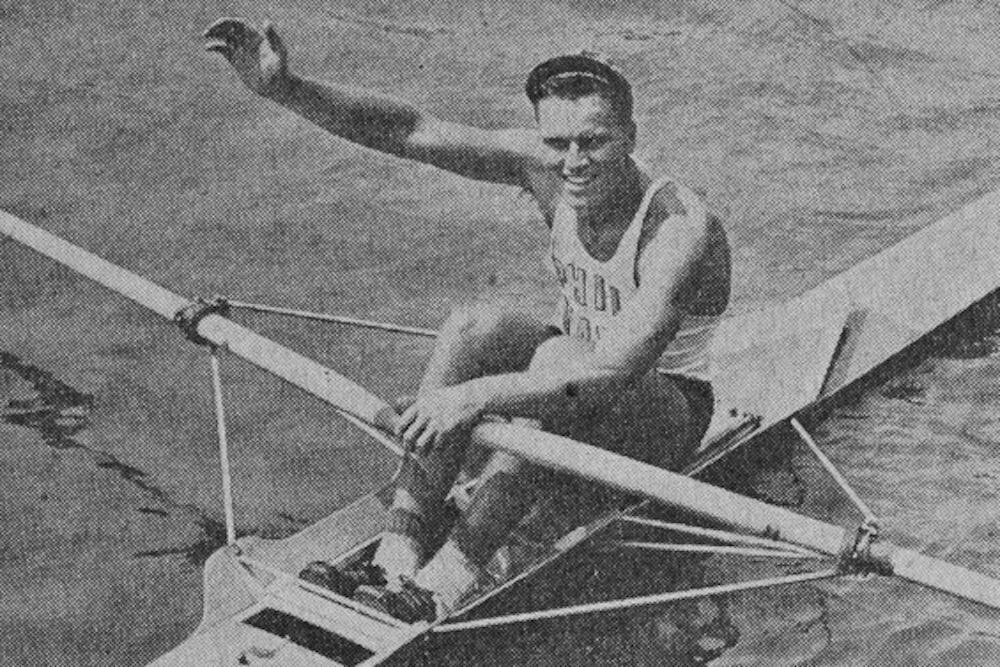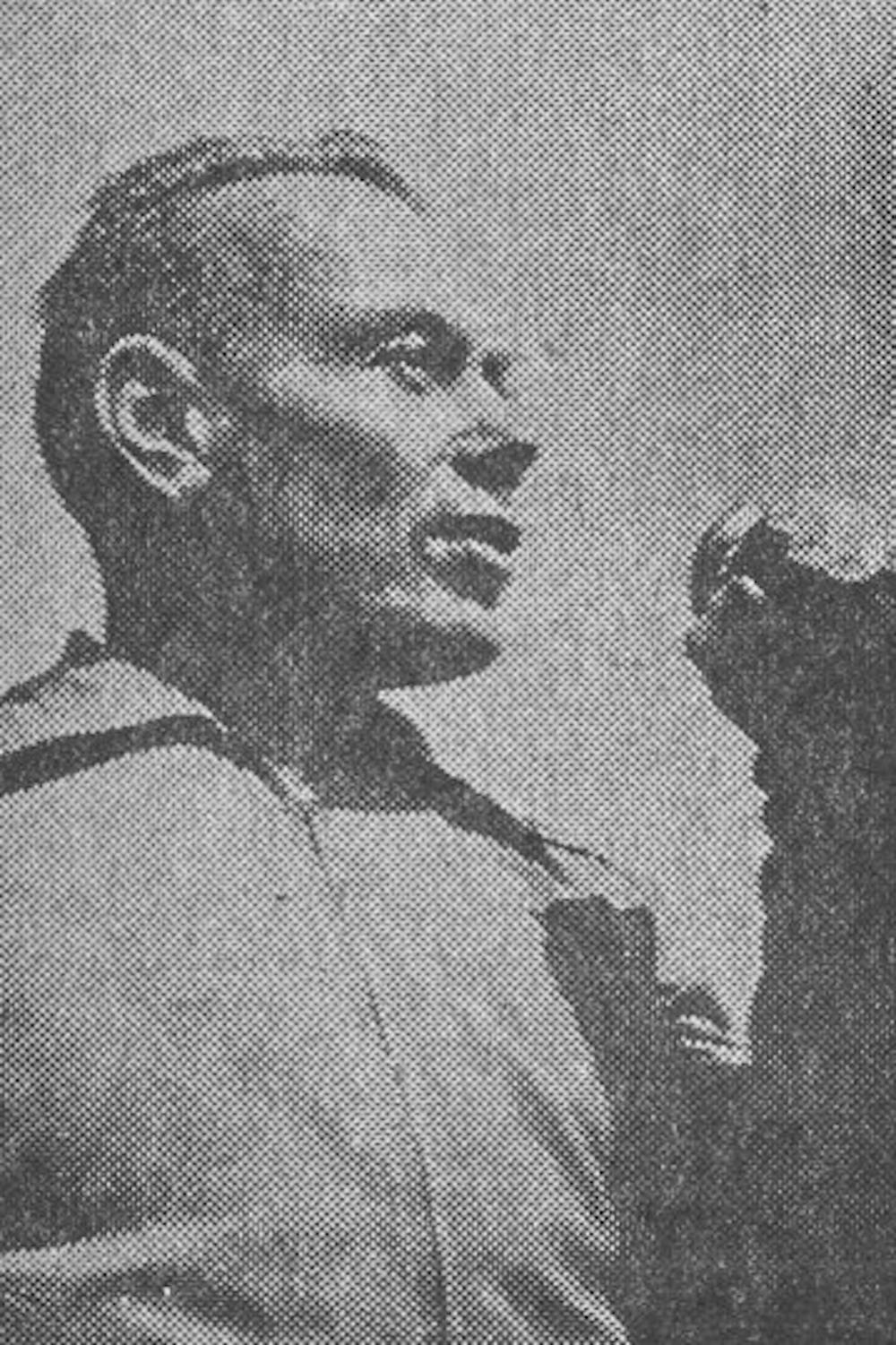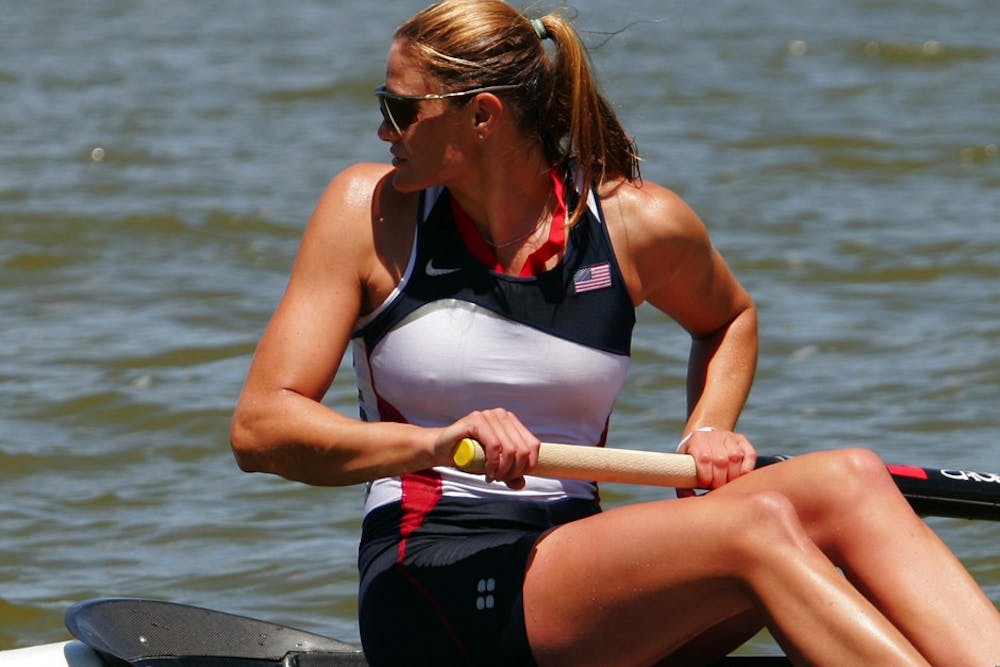
A Philadelphia native, John B. Kelly, Jr. made four Olympic appearances for the United States and won a bronze medal in 1956.
Credit: DP ArchivesAs the age of Penn track and field dominance at the Olympic Games was coming to an end, Penn rowing was just getting started.
Rowing was intended to be one of the original sports in the 1896 revival of the Olympics, but poor weather conditions in Athens prevented any races from going ahead as scheduled. Men’s rowing has subsequently appeared at every Summer Olympics since, although women’s rowing was not instituted in the Games until 1976.
A Quaker’s first appearance in an Olympic boat came in 1924. A four-man crew from the Bachelors Barge Club of Philadelphia, the oldest currently operating boathouse in the United States, qualified for the Paris Games after winning a rainy Trial race along the Schuylkill. Two of the four rowers, Sidney Jellinek and Eddie Mitchell, had once been stars for the Red and Blue, in addition to the coxswain, John G. Kennedy.
Together, Jellinek, Mitchell, and Kennedy helped capture Olympic bronze for the United States in men’s coxed fours.
Over the next two decades, more and more Penn rowers earned spots on the U.S. Olympic team, although none were able to make the podium. Leading up to the 1940 Games, all eyes were turning towards Joseph William Burk as the crew team’s next best chance to medal.
Burk had taken up the sport during his sophomore year at Penn and would eventually rise to captain as a senior in 1934, all while also competing on the football team. He took to rowing instantly, even developing his own sculling technique that involved shorter, sharper strokes to help preserve the boat’s momentum.
Although Burk failed to qualify for the Games in 1936, he immediately set his sights on rowing at the 1940 Olympics. He trained by lifting 50-pound boxes of apples at his family’s farm and rowing more than 3,000 miles in total at a nearby creek.
The unconventional training paid off. Burk won the national singles sculling title in the United States four times, and three times in Canada. He also became the first American to win the Henley Diamond Sculls twice, breaking the world record by eight seconds in 1938 and defending his title in 1939. Also in 1939, Burk was named recipient of the James E. Sullivan Award.
“Yearly bestowed on the outstanding amateur athlete in the United States, ‘who by his performance, example, and influence, does most to promote sportsmanship during the year’, the Sullivan Award stands for all that is highest and most wholesome in the sports world, and it is fitting that Burk, a shy, unassuming farm boy, should get the trophy,” The Daily Pennsylvanian wrote on Jan. 10, 1940.

Burk was all set to row representing the United States in the single sculls event in 1940, and he was widely expected to bring home the gold. But his dreams were dashed when the outbreak of World War II forced the cancellation of the Olympics entirely. Instead, Burk commanded a Patrol Torpedo boat during the war and was awarded the Navy Cross, Silver Star, and Bronze Star for his service.
After the war, Burk would return to Penn as a coach and associate professor, and he even joined the 1968 Olympic Committee. But one of the greatest rowers ever produced by Penn never had the chance to prove himself in an Olympic race.
The next Summer Olympics weren’t held until 1948 in London, with the hiatus due to WWII lasting 12 years. One of Penn’s several representatives that year was John Kelly Jr. in his first of four appearances as an athlete in the Games.
Kelly Jr. was heir to a remarkable family athletic legacy: his father, John Kelly Sr., was the first triple Olympic champion in the sport of rowing, and his mother, Margaret Majer, played a significant role in the development of women’s athletics at Penn. Also of note, his sister was Grace Kelly, actress and later Princess of Monaco.
“Although Kelly Sr. does not agree entirely with the rumor that his son was born with a miniature oar in his hand, he does admit that Young Kelly was quite an experienced sculler while in the primary grades,” the DP wrote on Apr. 11, 1947.
Kelly competed in the single scull event in London 1948 and again in Helsinki in 1952, one of the events which his father had won gold in three decades earlier. However, Kelly wouldn’t make the podium until the Melbourne Games in 1956, where he secured the bronze medal. After another appearance at the 1960 Games, Kelly served a brief stint as a manager of the U.S. eight-man boat in 1964, and he was elected president of the United States Olympic Committee in 1985.
While Ted Nash didn’t complete his undergraduate studies at Penn or compete as a Quaker, he brought his talent and experience to serve as a crew coach at Penn for both the freshman and varsity teams starting in 1965. Nash had previously rowed on both the coxless four shells in the 1960 Rome Olympics and 1964 Tokyo Olympics, capturing a gold and then bronze medal.
Nash became the first person to participate in 10 separate Games as either an athlete or coach following his involvement as coach of the 2004 U.S. crew team. He then made it 11 as coach of the men’s heavyweight coxless pair in 2008.
At the 1972 Games in Munich, Penn’s recently graduated crew captain Eugene Clapp III captured silver in the men’s eight event. Clapp rowed in the fourth seat, and he was joined by six former rival Harvard athletes in his boat.
In 1976, the first year women’s rowing was an Olympic sport, a Penn law student named Anita DeFrantz traveled to Montreal as a member of the U.S. women’s eight team. The crew was coached by a former Quaker, Harry Parker, who had been mentored by Burk as a Penn student and had himself finished fifth in the single scull at the 1960 Olympics. Under Parker’s tutelage, DeFrantz notched a bronze medal but was determined to improve upon that result, setting her sights on the 1980 Games.
The same year, Hugh Matheson, a 1971 College graduate, won silver on behalf of Great Britain as part of the men’s coxed four team.
In her preparations for the 1980 Moscow Olympics, DeFrantz won a silver medal at the 1978 World Championships and was crowned United States National Champion six times.
However, a promising Penn rower’s Olympic hopes were once again thwarted by circumstances out of their control. The United States boycotted the 1980 Games in protest to the USSR’s invasion of Afghanistan, but DeFrantz was so determined to get a second chance at gold, she filed a lawsuit in an attempt to bypass the boycott. The lawsuit ultimately failed, but DeFrantz, along with the rest of the 1980 U.S. Olympic team, received a Congressional Gold Medal to honor her efforts.
DeFrantz has remained heavily involved in the Olympics even after retiring as a rower. In 1986, she became the first woman and first Black person to represent the United States on the International Olympic Committee. In 1997, she was elected to vice president of the IOC, becoming the first woman to hold that position. DeFrantz was re-elected to another four-year term as IOC vice president in 2017.
Fellow Quaker Philip Steckl had also been denied a chance at competing in the 1980 Games, but he was able to recompense with a silver medal four years later in the coxless four-man race. Penn graduate Lisa Rohde also won silver that year at the Los Angeles Games as a member of the U.S. women’s quadruple sculls team.
John Pescatore came third on the podium at the 1988 Seoul Olympics with the U.S. men’s coxed eight team, and he would return four years later to the Games in Barcelona as part of the men’s coxless pair, where he came in sixth.
Pescatore, who graduated from Penn in 1986, briefly served as assistant coach at his alma mater. In 2000, he was also assistant coach to the U.S. Olympic team, helping the men’s coxless pair to a silver medal in Sydney and earning U.S. Rowing Coach of the Year honors. Pescatore had a stint as head coach of Yale’s crew team from 2002 to 2010.
1993 Wharton graduate L. Janusz Hooker captured bronze at the 1996 Olympics in Atlanta as part of the Australian quad scull team. Sarah Garner, who graduated from Penn in 1994, later won a bronze medal at the 2000 Olympics in the women’s lightweight double sculls.
The most recent Quaker to win an Olympic rowing medal was Susan Francia, who rose from a walk-on to a world champion. Francia began rowing as a sophomore at Penn, improving so quickly she ended her collegiate career having earned All-American honors with an eye towards the Olympics.

Francia’s dream was soon realized at the 2008 Beijing Olympics, where she won gold for the United States in the women’s eight. At the 2012 London Olympics, Francia was able to recover from a herniated disc and broken ribs to repeat as champion in the same event. Two generations of Penn rowers came together that year atop the podium when DeFrantz presented Francia her medal.
Francia never forgot the place where she first learned her craft.
“I completely remember my first row ever on the Schuylkill, seeing Boathouse Row on my left and seeing the Philadelphia skyline on my right and I was on the water and I was like, ‘This is awesome, this is so much fun.’ I just absolutely loved it,” Francia told the DP after she was first named an Olympian in 2008.
Francia became the first Quaker to win two Olympic gold medals since William Arthur Carr, a sprinter, did the same in 1932. With her recent successes, the era of Penn rowing’s Olympic superiority might not be over yet.
The question now is: who’s next?
The Daily Pennsylvanian is an independent, student-run newspaper. Please consider making a donation to support the coverage that shapes the University. Your generosity ensures a future of strong journalism at Penn.
Donate







